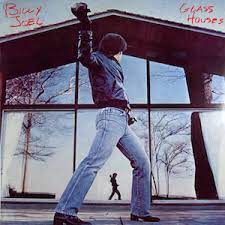BILLY JOEL : GLASS HOUSES
- You May Be Right
- Sometimes a Fantasy
- Don't Ask Me Why
- It's Still Rock and Roll to Me
- All for Leyna
- I Don't Want to Be Alone
- Sleeping with the Television On
- C'était Toi (You Were the One)
- Close to the Borderline
- Through the Long Night
Label : Columbia
Release Date : March 12, 1980
Length : 35:06
Review (AllMusic) : The back-to-back success of The Stranger and 52nd Street may have brought Billy Joel fame and fortune, even a certain amount of self-satisfaction, but it didn't bring him critical respect, and it didn't dull his anger. If anything, being classified as a mainstream rocker - a soft rocker - infuriated him, especially since a generation of punks and new wave kids were getting the praise that eluded him. He didn't take this lying down - he recorded Glass Houses. Comparatively a harder-rocking album than either of its predecessors, with a distinctly bitter edge, Glass Houses still displays the hallmarks of Billy Joel the pop craftsman and Phil Ramone the world-class hitmaker. Even its hardest songs - the terrifically paranoid "Sometimes a Fantasy," "Sleepin' With the Television On," "Close to the Borderline," the hit "You May Be Right" - have bold, direct melodies and clean arrangements, ideal for radio play. Instead of turning out to be a fiery rebuttal to his detractors, the album is a remarkable catalog of contemporary pop styles, from McCartney-esque whimsy ("Don't Ask Me Why") and arena rock ("All for Leyna") to soft rock ("C'etait Toi [You Were the One]") and stylish new wave pop ("It's Still Rock and Roll to Me," which ironically is closer to new wave pop than rock). That's not a detriment; that's the album's strength. The Stranger and 52nd Street were fine albums in their own right, but it's nice to hear Joel scale back his showman tendencies and deliver a solid pop/rock record. It may not be punk - then again, it may be his concept of punk - but Glass Houses is the closest Joel ever got to a pure rock album.
Review (Wikipedia) : Glass Houses is the seventh studio album by American singer-songwriter Billy Joel, released on March 12, 1980. It features Joel's first song to peak at No.1 on Billboard's Pop Singles chart, "It's Still Rock and Roll to Me". The album itself topped the Pop Albums chart for six weeks and was ranked No.4 on Billboard's 1980 year-end album chart. The album is the 41st best selling album of the 1980s, with sales of 7.1 million copies in the U.S. alone. In 1981, Joel won a Grammy Award for "Best Male Rock Vocal Performance" for his work on Glass Houses. According to music critic Stephen Thomas Erlewine, the album featured "a harder-edged sound" compared to Joel's other work, in response to the punk and new wave movements. This was also the final studio album to feature the original incarnation (Joel, Richie Cannata, Doug Stegmeyer, Russell Javors and Liberty DeVitto) of the Billy Joel Band, augmented by new lead guitarist David Brown. Multi-instrumentalist Cannata left the band just before the sessions began for Joel's next studio album, 1982's The Nylon Curtain. This album was the third collaboration between Joel and producer Phil Ramone, following The Stranger and 52nd Street and the final such collaboration in association with Home Run. Opening with the sound of glass shattering, Glass Houses has more of a hard rock feel than Joel's previous albums. The cover shows Joel poised to throw a rock through the two-story window of his real-life waterfront glass house in Cove Neck. On some versions, the back cover shows Joel looking through the hole that the rock made in the glass. This alludes to the adage that "people in glass houses shouldn't throw stones". Rolling Stone critic Paul Nelson stated: "Billy Joel writes smooth and cunning melodies, and what many of his defenders say is true: his material's catchy. But then, so's the flu." In Christgau's Record Guide: The '80s (1990), Robert Christgau said: "From the straight-up hubba-hubba of 'You May Be Right' to the Rick Wakeman ostinatos of 'Sometimes a Fantasy' to the McCartneyesque melodicism of 'Don't Ask Me Why' to the what-it-is of 'It's Still Rock and Roll to Me,' it's all rock and roll to him, but to me it's closer to what pop meant before ironists and aesthetes, including yours truly, appropriated the term. Closer than any skinny-tie bands, that's for sure: gregarious, shameless, and above all profitable. Of course, if it doesn't make up in reach what it lacks in edge, ironists and aesthetes needn't notice it's there. And beyond 'Sleeping With the Television On,' I couldn't tell you thing one about side two, which I just played three times." In 2004, the pop-culture journalist and rock critic Chuck Klosterman praised the album in an essay on Joel titled "Every Dog Must Have His Every Day, Every Drunk Must Have His Drink" from his book Sex, Drugs, and Cocoa Puffs (the title of the essay refers to a line from the Glass Houses song "Don't Ask Me Why"). In particular, Klosterman praised some of the more obscure tracks from the album including "All for Leyna", "I Don't Want to Be Alone", "Sleeping with the Television On" and "Close to the Borderline." In a retrospective review, Stephen Thomas Erlewine of AllMusic wrote: "It may not be punk - then again, it may be his concept of punk - but Glass Houses is the closest Joel ever got to a pure rock album."
